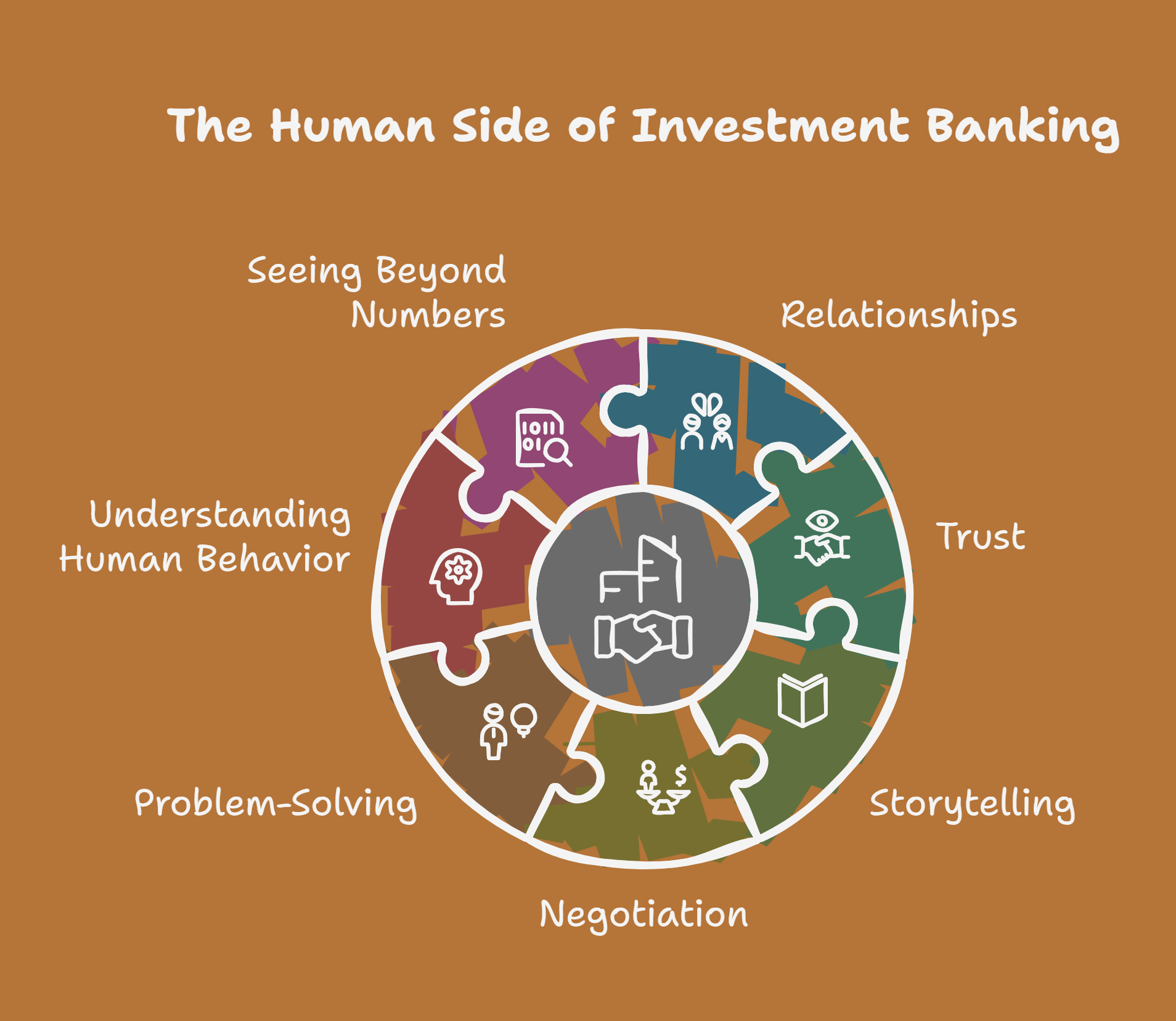Wall Street — just hearing the name brings to mind busy trading floors, high-stakes deals, and fast money. But beyond all the action, there’s a world of confusing terms and abbreviations that can be hard to understand if you’re new to it.
That’s where this glossary comes in. It breaks down 50+ important words and acronyms in simple language, so you can feel more confident and better prepared to step into the world of investment banking.
From IPOs to M&A: Decoding the Dealmakers' Dictionary
Entering the world of investment banking feels like stepping into a foreign country. Suddenly everyone’s speaking a different language. Forget “earnings,” now it’s EBITDA. “Merger” becomes “M&A,” a whole new beast altogether. But don't be intimidated. Mastering this vocabulary is the first step to understanding the intricate dance of high finance.
Let’s start with the basics.
Key Terms & Acronyms
Valuation & Financial Metrics
-
EBITDA – Earnings Before Interest, Taxes, Depreciation, and Amortization. A key profitability measure.
-
DCF (Discounted Cash Flow) – Estimates a company’s value based on future cash flows.
-
Enterprise Value (EV) – Total value of a business including debt and equity.
-
P/E Ratio (Price-to-Earnings) – Compares a company's share price to its earnings per share.
-
PEG Ratio – P/E ratio adjusted for growth; helps compare growth companies.
-
NPV (Net Present Value) – The present value of future cash flows minus initial investment.
-
IRR (Internal Rate of Return) – The discount rate that makes NPV = 0.
-
FCF (Free Cash Flow) – Cash generated after capital expenses.
-
ROE (Return on Equity) – Measures profitability relative to shareholders' equity.
-
ROIC (Return on Invested Capital) – Measures efficiency of capital use.
-
Accretion/Dilution – Impact of M&A on EPS.
-
Tangible Book Value – Net asset value excluding intangibles like goodwill.
Corporate Finance & M&A
-
IPO (Initial Public Offering) – A company’s first public sale of shares.
-
M&A (Mergers and Acquisitions) – The consolidation of companies or assets.
-
LBO (Leveraged Buyout) – Acquisition using significant debt, often secured by target assets.
-
Due Diligence – Detailed investigation before making an investment or acquisition.
-
Synergy – Financial benefits achieved from combining two companies.
-
Spin-Off – Creating a new independent company from an existing division.
-
Carve-Out – Selling a business unit, but retaining ownership.
-
Reverse Merger – A private company becomes public by merging with a public shell company.
-
Fairness Opinion – A report confirming a deal is financially fair to shareholders.
-
Tender Offer – Offer to buy shares directly from shareholders, often above market price.
-
Earnout – Future payments contingent on performance post-acquisition.
-
SPA (Share Purchase Agreement) – Contract to transfer ownership of shares.
-
APA (Asset Purchase Agreement) – Contract for acquiring a business’s assets.
-
Drag-Along Rights – Majority shareholders can compel minority shareholders to sell.
-
Tag-Along Rights – Minority shareholders can join majority in a sale.
Capital Markets & Fundraising
-
Underwriting – Investment banks guarantee the sale of securities in offerings.
-
Roadshow – Investor presentations before an IPO.
-
Bookbuilding – Collecting investor interest to determine the offering price.
-
PIPE (Private Investment in Public Equity) – Private investors buy shares in a public company.
-
Follow-On Offering – Sale of additional shares post-IPO.
-
Convertible Bonds – Debt that can be converted into equity.
-
Preferred Stock – Hybrid security with features of debt and equity.
-
Greenshoe Option – Allows underwriters to issue more shares in a hot IPO.
-
Shelf Registration – Allows companies to register securities for future issuance.
-
Bridge Loan – Short-term loan until longer-term financing is secured.
-
High-Yield Bonds – Riskier, higher-interest bonds (junk bonds).
-
Syndicated Loan – Loan provided by multiple lenders.
Analysis & Modeling
-
Comps (Comparable Company Analysis) – Valuation using multiples of similar companies.
-
Precedent Transactions – Valuation based on similar past deals.
-
Sensitivity Analysis – Tests how outcome changes when variables change.
-
Scenario Analysis – Assesses different future outcomes under various assumptions.
-
Monte Carlo Simulation – Probability-based risk modeling.
-
Credit Analysis – Evaluating a company’s ability to repay debt.
Legal, Regulatory & Documents
-
Prospectus – Legal document detailing an investment offering.
-
SEC (Securities and Exchange Commission) – Regulates U.S. markets.
-
S-1 Filing – Document filed with SEC to go public.
-
10-K / 10-Q – Annual and quarterly reports required by SEC.
-
Reg D (Regulation D) – Allows private security offerings without full SEC registration.
-
Blue Sky Laws – State securities laws for investor protection.
-
Chinese Wall – Internal information barrier between departments to prevent conflicts.
This list, though not exhaustive, covers some of the most commonly encountered terms. As you delve deeper into the world of investment banking, you'll encounter even more specialized language. Don't be discouraged! Every term learned is a step closer to fluency in the language of finance.
Beyond the Jargon: The Human Element
While mastering the technical jargon is important, remember that investment banking is, at its core, a human endeavor. Deals are built on relationships, trust, and the ability to connect with people. The best investment bankers aren't just financial wizards; they're storytellers, negotiators, and problem-solvers.
They understand the nuances of human behavior, the motivations that drive both companies and investors. They’re able to see beyond the numbers and grasp the underlying value of a business, its potential for growth and innovation.

Navigating the Future of Finance
The world of finance is constantly evolving. New instruments, strategies, and technologies emerge every day. The glossary above provides a solid foundation, but continuous learning is key to staying ahead of the curve. Embrace the challenge, dive in, and explore the fascinating world of investment banking. The future of finance awaits.
Dreaming of a finance career? Start with Investment Banking Certification with Jobaaj Learnings.
















